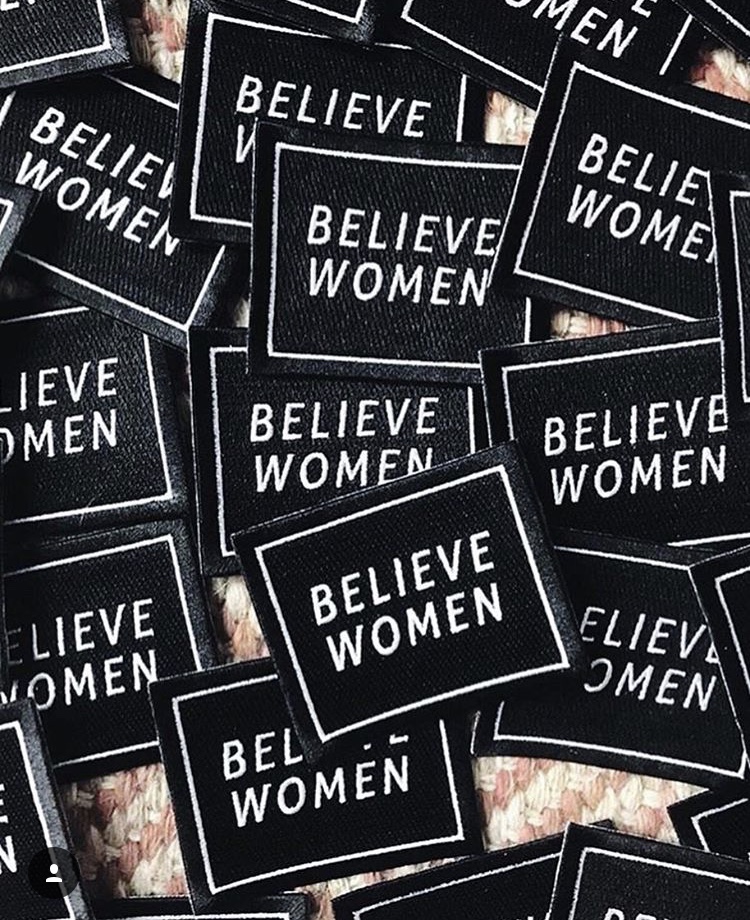Another Day in America
Written by Mara Strobel-Lanka
Patch by Natalia Czajkiewicz. Photo by Jane Hall.
As I’m writing this, I can’t sleep. It’s been a week since I first heard Dr. Christine Blasey Ford’s voice describe the assault she alleges, with one hundred percent certainty, that Supreme Court Nominee Brett Kavanaugh inflicted on her when the two of them were in high school. It’s been six days since I called my best friend in tears and five since I woke up from a dream that my assaulter was in the room with me. It’s been an entire week of retelling and reliving and re-politicizing our nightmares. It’s been an hour since I cried and thirty seconds since my grief climbed up my throat and into the world, a drowned out cry of “me too”.
I’ve been told via articles and tweets that this feeling is called rage. I’ve read in the New York Times and heard from elevators that my pain is the pain of millions of women. I’ve followed the statistics: 1 in 3 women experience sexual assault. That equates to at least one woman on our startup team, three of my closest friends, six women in the coffee shop where I write this, and fifty million women all across America.
A year ago, I wrote roughly this same article addressing the Harvey Weinstein allegations.
“Dear Weinstein”, it said, filled with that acclaimed rage, “I’m grabbing back.”
It was a time ridden with novelty as the #metoo movement took hold. As women stood up across different industries, races, demographics, and landscapes, the world looked over each shoulder, keeping tally of the accused and measurement of the accusers. Slowly, surely, and overwhelmingly, women were standing up to the power dynamics that had long silenced us. A few men lost their jobs, a few more lost their “good names”, and many more took to newsstands and radio hours wondering who was safe? Which man would be condemned next? Which icons could be taken down by mere victims? Which reflections of their own sexual histories would they read in the New Yorker tomorrow?
For those then and now who still live in reminiscent times of patriarchy and sexual privilege, “it’s a scary time for men in America.”
For women who live in fear that their assaults will be denied, ridiculed, amplified, and mocked by the most powerful authorities in our nation, it is just another day in America.
Just another day in America, where a white male majority will decide on the ratio of value between a woman’s pain, and a man’s success. Just another day in America, where we must work to earn, on average, 79 cents of a man’s dollar. Just another day in America, where we must put aside our rage and do what we are told.
“There is a lot of work to be done, a lot of stories to be told, and a lot of glass left to be shattered,” I wrote, a year before our President would mock a credible victim of sexual assault in front of uproarious laughter.
Since then, women in America have run for office and pursued success in momentous numbers. We have told our stories and sought our justice and sustained our mental health with new and necessary bravery. We have cracked and cracked and cracked at the glass ceiling. We have worked too hard to be laughed at. We have awaited equality too long for it to be swept underneath the tacky rug of an outdated political agenda.
And we have hurt, too much, to return to the power norms that have silenced us.
In the 62 calls I’ve made to Senators this week, not one has made it to a real person. The voicemails have been flooded and our calls have been loud.
Because of Christine Blasey Ford, I no longer worry that Lindsey Graham’s staff will laugh at the shake in my voice, at the tears in my words, at my expense. I know that I will call with more clarity tomorrow. I know I will donate my spare change to his future opponent’s campaign. I know I will vote out privilege in November.
Mostly I know that like this week, like last year, like tomorrow, I will cry my tears and bare my pain and fight again and again and again. I will go into work, I will call my senators, I will believe survivors, I will do my best. I will crack and crack and crack at the glass ceiling. Because that’s what women do in America.
Born and raised in Grand Rapids, Michigan, Mara is a political field organizer by day, and the BWH Creative Director by nights and weekends. Her passions include writing, sailing, walking, thinking of her next meal and planning her next dinner party.





